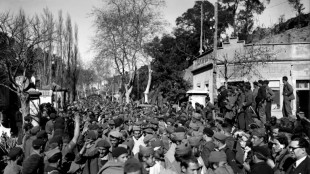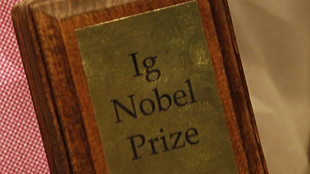
-
 US troops in Syria killed in alleged IS ambush
US troops in Syria killed in alleged IS ambush
-
Jalibert masterclass guides Bordeaux-Begles past Scarlets

-
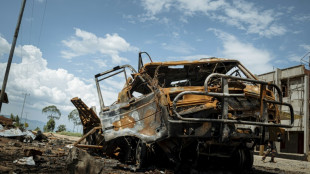 M23 marches on in east DR Congo as US vows action against Rwanda
M23 marches on in east DR Congo as US vows action against Rwanda
-
Raphinha double stretches Barca's Liga lead in Osasuna win

-
 Terrific Terrier returns Leverkusen to fourth
Terrific Terrier returns Leverkusen to fourth
-
Colts activate 44-year-old Rivers for NFL game at Seattle

-
 US troops in Syria killed in IS ambush attack
US troops in Syria killed in IS ambush attack
-
Liverpool's Slot says 'no issue to resolve' with Salah after outburst

-
 'Stop the slaughter': French farmers block roads over cow disease cull
'Stop the slaughter': French farmers block roads over cow disease cull
-
Stormers see off La Rochelle, Sale stun Clermont in Champions Cup

-
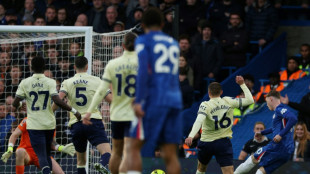 Maresca hails Palmer as Chelsea return to winning ways against Everton
Maresca hails Palmer as Chelsea return to winning ways against Everton
-
Hungarian protesters demand Orban quits over abuse cases
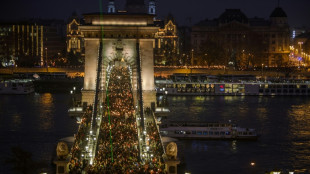
-
 Belarus frees protest leader Kolesnikova, Nobel winner Bialiatski
Belarus frees protest leader Kolesnikova, Nobel winner Bialiatski
-
Salah sets up goal on return to Liverpool action
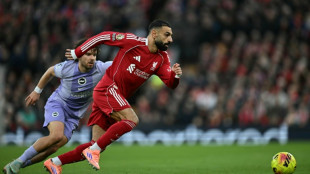
-
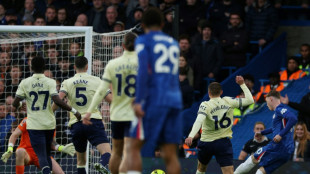 Palmer strikes as Chelsea return to winning ways against Everton
Palmer strikes as Chelsea return to winning ways against Everton
-
Pogacar targets Tour de France Paris-Roubaix and Milan-San Remo in 2026

-
 Salah back in action for Liverpool after outburst
Salah back in action for Liverpool after outburst
-
Atletico recover Liga momentum with battling win over Valencia

-
 Meillard leads 'perfect' Swiss sweep in Val d'Isere giant slalom
Meillard leads 'perfect' Swiss sweep in Val d'Isere giant slalom
-
Salah on Liverpool bench for Brighton match

-
 Meillard leads Swiss sweep in Val d'Isere giant slalom
Meillard leads Swiss sweep in Val d'Isere giant slalom
-
Indonesia flood death toll passes 1,000 as authorities ramp up aid
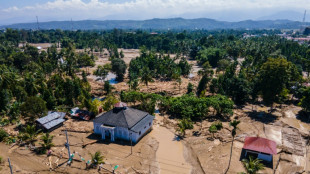
-
 Cambodia shuts Thailand border crossings over deadly fighting
Cambodia shuts Thailand border crossings over deadly fighting
-
First urban cable car unveiled outside Paris
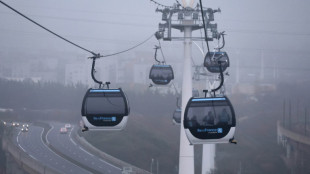
-
 Vonn second behind Aicher in World Cup downhill at St Moritz
Vonn second behind Aicher in World Cup downhill at St Moritz
-
Aicher pips Vonn to downhill win at St Moritz

-
 Thailand says 4 soldiers killed in Cambodia conflict, denies Trump truce claim
Thailand says 4 soldiers killed in Cambodia conflict, denies Trump truce claim
-
Fans vandalise India stadium after Messi's abrupt exit
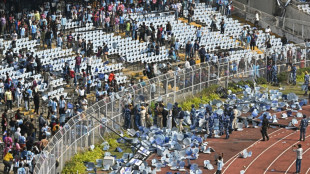
-
 Women sommeliers are cracking male-dominated wine world open
Women sommeliers are cracking male-dominated wine world open
-
Exhibition of Franco-Chinese print master Zao Wou-Ki opens in Hong Kong

-
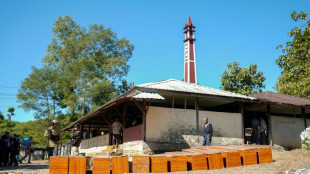 Myanmar junta denies killing civilians in hospital strike
Myanmar junta denies killing civilians in hospital strike
-
Why SpaceX IPO plan is generating so much buzz

-
 Thailand continues Cambodia strikes despite Trump truce calls
Thailand continues Cambodia strikes despite Trump truce calls
-
US envoy to meet Zelensky, Europe leaders in Berlin this weekend

-
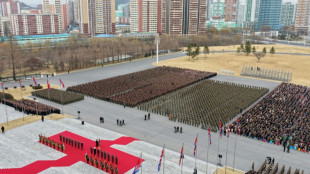 North Korea acknowledges its troops cleared mines for Russia
North Korea acknowledges its troops cleared mines for Russia
-
US unseals warrant for tanker seized off Venezuelan coast

-
 Cambodia says Thailand still bombing hours after Trump truce call
Cambodia says Thailand still bombing hours after Trump truce call
-
Machado urges pressure so Maduro understands 'he has to go'

-
 Leinster stutter before beating Leicester in Champions Cup
Leinster stutter before beating Leicester in Champions Cup
-
World stocks mostly slide, consolidating Fed-fuelled gains

-
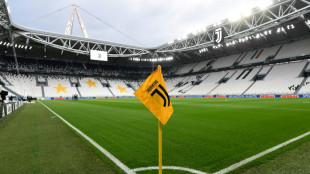 Crypto firm Tether bids for Juventus, is quickly rebuffed
Crypto firm Tether bids for Juventus, is quickly rebuffed
-
Union sink second-placed Leipzig to climb in Bundesliga

-
 US Treasury lifts sanctions on Brazil Supreme Court justice
US Treasury lifts sanctions on Brazil Supreme Court justice
-
UK king shares 'good news' that cancer treatment will be reduced in 2026
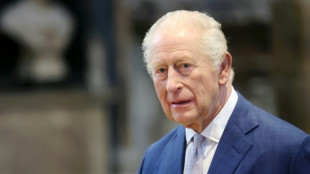
-
 Wembanyama expected to return for Spurs in NBA Cup clash with Thunder
Wembanyama expected to return for Spurs in NBA Cup clash with Thunder
-
Five takeaways from Luigi Mangione evidence hearings
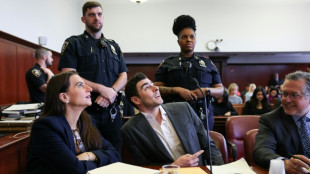
-
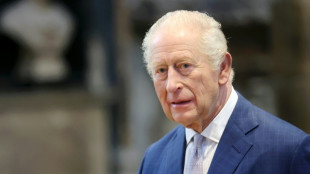 UK's king shares 'good news' that cancer treatment will be reduced in 2026
UK's king shares 'good news' that cancer treatment will be reduced in 2026
-
Steelers' Watt undergoes surgery to repair collapsed lung

-
 Iran detains Nobel-prize winner in 'brutal' arrest
Iran detains Nobel-prize winner in 'brutal' arrest
-
NBA Cup goes from 'outside the box' idea to smash hit


80 years since daring 'cockleshell' raid on Nazi ships in France
France marks next week the 80th anniversary of a daring World War II raid by British Royal Marines, who slipped past German patrols up the Gironde estuary to mine crucial supply ships.
Dubbed "The Cockleshell Heroes" in a 1950s book and film after their tiny canvas-and-plywood boats, the 10-man infiltration team set off on "Operation Frankton" on December 7, 1942.
Faces blackened against detection, they slipped from a submarine near the entrance to the estuary for a 100-kilometre (60-mile) moonlight paddle trek that would take several nights to complete, resting on the banks by day.
Their mission was to sink ships moored in the port of Bordeaux that had been running arms and raw materials between German and its ally Japan.
That objective complete, the commandos would then have to make their own way another 160 kilometres overland to a meeting with resistance fighters, who would smuggle them into Vichy France.
Historian Robert Lyman dubbed the attack "Operation Suicide" in a 2012 book.
Although young -- the men under the command of Major Herbert Hasler were mostly in their early 20s -- the unit scored a resounding success, blasting five ships in the early hours of December 12.
But only Hasler himself and his boat mate William Sparks made it home alive four months later, after fleeing on foot, by bicycle and on trains to Gibraltar.
- 'The Germans were everywhere' -
Six members of the team died before even they even reached the target.
Two men, George Sheard and David Moffat, drowned off the French coast, with Sheard's body never found.
Swells capsized the boat of Samuel Wallace and Robert Ewart, who were captured and shot by the Germans -- as were John MacKinnon and James Conway, taken after their boat was holed near Bordeaux.
After the attack, French informants gave up Alfred Laver and William Mills to the occupiers as they were trying to make their way home. Their names are on a war memorial in the village of Montlieu-La-Garde.
Around 20 plaques around the region recall the commando raid, says Erik Poisneau, president of the Frankton Souvenir (Frankton Memory) association.
The attack was "a physical and nautical feat" pitting the marines against the natural forces of Europe's largest estuary, Poisneau says.
Although "the Germans were everywhere", it had been "unthinkable" for them that the Allies would even attempt such a raid, he adds.
For historian Sebastien Albertelli, the mission had a "psychological, propaganda dimension" for the British. It showed that London could "strike at the heart of the enemy forces" at a time when the tide of the war had yet to clearly turn.
- 'The chicken is tasty' -
After placing their mines and scuttling their kayaks downstream, the exfiltration became "just as extraordinary as the mission itself," says Christophe Soulard, author of "Frankton: the Unbelievable Odyssey".
Navigating with map and compass with a few francs in their pockets, Hasler and Sparks crossed the river Charente. But while some locals welcomed them, others were hostile.
One farmer who put them up, Clodomir Pasqueraud, asked them to have the words "the chicken is tasty" broadcast on the BBC when they return -- code to let those who had helped them know they had made it back safely.
In one village, three people including a 16-year-old boy were sent to the concentration camps for helping the British commandos.
"They never came back," says Monique Babin, an expert on the operation who has become an associate member of Britain's Special Boat Service Association.
A restaurateur who put them up asked for another poultry-based BBC message -- "the two chickens have arrived" -- and both were transmitted in April 1943 after Hasler and Sparks were helped to Gibraltar by the "Marie-Claire" resistance network.
Neither man had fired a shot during the whole operation.
Known as "Blondie" for the colour of his bushy moustache, Hasler became a well-known sport sailor, launching and competing in the first solo transatlantic race.
Having joined up to avenge his brother's death in combat, Sparks became a trolleybus driver after the war, but fell on hard times and had to sell his medals at auction.
Y.Shaath--SF-PST

